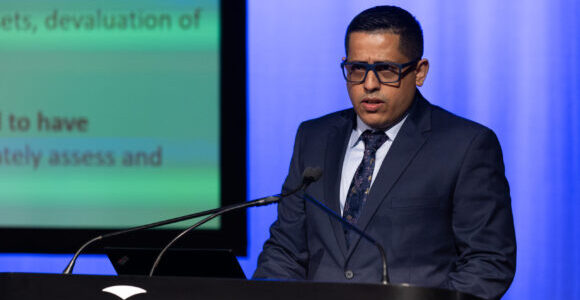The newly established Green Finance Centre in Papua New Guinea is working with four financial institutions to pilot a framework to encourage investments in green projects such as renewable energy and sustainable agriculture. Its head Mohinesh Prasad shares the centre’s plans.

The Green Finance Centre’s Mohinesh Prasad speaking at the 2024 Business Advantage PNG Investment Conference. Credit: BAI/Stefan Daniljchenko
Papua New Guinea’s recently established Green Finance Centre will create a formal framework which encourages lenders to support investments in areas such as renewable energy and sustainable agriculture, according to the centre’s head, Mohinesh Prasad.
“Today, the banks are already lending in the green space, but there is no formal reporting mechanism for green projects,” Prasad told the 2024 Business Advantage PNG Investment Conference in August.
“Ninety per cent of green investments in any country come through the private sector… and that’s why we’re working through the financial institutions to provide an enabling environment for the private sector to borrow and be able to invest in green projects [in PNG].”
Meeting global standards
Launched in March this year, the Green Finance Centre is a collaborative effort led by the Bank of Papua New Guinea (BPNG), with funding from the Seoul-based Global Green Growth Institute (GGGI) and the New Zealand Government.
The centre is currently working with four financial institutions – BSP Financial Group, ANZ Banking Group PNG, Nationwide Micro Bank (MiBank) and Women’s Micro Bank – to pilot the application of its Inclusive Green Finance Policy in lending operations.
Prasad said the pilot will help measure what needs to be done to ensure the country’s financial institutions are compliant with global green lending standards. He noted the warning by KPMG’s Geri McMahon, who also presented at the conference, of “a wave of regulation on climate disclosure” coming into effect around the world which is placing new demands on investors seeking project finance.
“The Bank of Papua New Guinea’s aspiration is that, if you are to operate within the financial ecosystem of PNG, you need to have a certain green lending ratio,” Prasad said.
“At the moment, we lack data… Through this project, we will be able to identify where we stand and, hopefully, we’ll be able to [decide on a green] ratio for financial institutions.”
Defining green projects
As part of the formulation of the policy, the BPNG created a taxonomy which sets out the different types of investments that could be classified as ‘green’ in a Papua New Guinean context.
The taxonomy is divided into 11 categories:
- Agriculture, sustainable land use and marine resources
- Renewable energy
- Energy efficiency
- Clean transport
- Green buildings and urban development
- Small industry improvements in energy efficiency
- Water and wastewater
- Pollution prevention, waste and control
- Information and communications technology
- Greenhouse gas reduction and transition to low-carbon activities
- Disaster Resilience, Recovery and Climate Change Adaptation
In Prasad’s opinion, the 2024 Enga landslide was “a tragic reminder” of the necessity of making the country’s financial system more resilient in the face of climate change.
“Climate-related events such as natural disasters and policy shifts designed to curb climate impact can cause significant disruptions in financial markets. This can lead to liquidity problems and increase volatility, which in turn can destabilise the PNG economy,” he said during a virtual address to the GGGI’s flagship annual event, held last week in Seoul.
He said that mobilising investments towards climate-resilient infrastructure and other green projects will help reduce the exposure of PNG’s financial institutions to climate risks.
Elizabeth Genia, Governor of the Bank of Papua New Guinea, also spoke about the Green Finance Centre at the GGGI event. Ultimately, Genia said, the centre will go beyond mobilising capital for green investments.
“It is also about providing education on sustainability, promoting environmentally responsible lifestyle choices, and empowering people to learn more about green financing options.”









Speak Your Mind